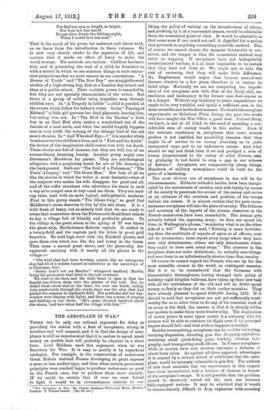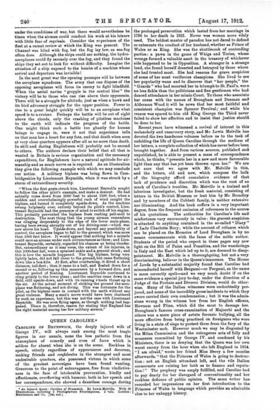THE AEROPLANE IN WAR.* `THERE can be only one rational
argument for delay in providing the nation with a fleet of aeroplanes, strong in numbers and well manned, and it is that the design of aero- _planes is still so experimental that it is useless to spend much money on models that will probably be obsolete in a short -time. Lord Haldane used this argument when he was :Secretary for War. It is easy to justify it by superficial analogies. For example, in the construction of motor-cars Great Britain watched France developing at 'great expense a more or less perfect type, and then when certain permanent principles were reached began to produce motor-cars as good as the French ones, but to produce them more cheaply. If we could be certain that if ever we were forced to fight it would be in circumstances entirely to our
• The Aeroplane in War. By Claude Grahame-White and Harry Harper. London : T. Werner Laurie. (Us. 6d. net.]
liking, the policy of waiting on the inventiveness of others, and profiting by it at a convenient season, would be admirable from the economical point of view. It would be admirable in that sense even if one could not call it dignified for a nation that pretends to anything resembling scientific method. But, of course, we cannot choose the moment favourable to our- selves, and the danger is that the economical method may catch us napping. If aeroplanes have not indisputably revolutionized warfare, it is at least impossible to be certain that they have not done so. We ought not to take the risk of assuming that they will make little difference. No Englishman would argue that because men-of-war become obsolete in a few years therefore it is useless to build ships. Naturally we are not comparing the import.. ance of our aeroplane arm with that of the Navy, still, un- readiness and inadequacy in the former case does expose us to a danger. Without any tendency to panic expenditure we ought to be very watchful and spend a sufficient sum in the most scientific and methodical manner. No doubt the aeroplane experiments on Salisbury Plain during the past two weeks will have taught the War Office a good deal. Colonel Seely, we know, is not at all blind to the need of spending a con- siderable sum of money wisely in this matter. Even if the extreme confidence in aeroplanes that some airmen profess is not justified, the possibility remains that they might be of service to an enemy attacking us- in quite unexpected ways and to an unforeseen extent. And what should we say and think then if we had grudged a sum =of money proportionate to the outlay of other Powers, and, by grudging it, had failed to stop a gap in our scheme of defence ? Aeroplanes are comparatively cheap things. Hundreds of military monoplanes- could be built for the price of a battleship.
The most obvious use of aeroplanes in war will be for reconnaissance. Hitherto orthodox battles have been inaugu- rated by the movements of cavalry, each Bide trying by means of its cavalry to penetrate the screen of the enemy and arrive at an estimate of the numbers and position of the troops behind the screen. It is almost certain that for pure recon- naissance aeroplanes will take the place of cavalry. The fullness and accuracy of the reports of the airmen observers in the French manceuvres have been remarkable. The airman gets actually behind the opposing army ; he does not spend his time, in Wellington's phrase, "wondering what is on the other side of a hill." Napoleon said, "Nothing is more bewilder- ing than the multitude of reports of spies, or of officers, sent out to reconnoitre ; some report army corps where they have seen only detachments; others see only detachments where they ought to have seen army corps." The observer in the aeroplane does not make deductions ; he actually sees things, and sees them in an infinitesimally shorter time than cavalry.
Of course-we cannot regard the French, who are by far the most scientific airmen in the world, as contingent enemies. But it is to be remembered that the Germans with characteristic thoroughness, having changed their policy of building rigid dirigible balloons, have taken up their new task with all the enthusiasm of the old, and will no doubt spend money as, freely as they did on their earlier mistakes. They. have already planned -to spend £640,000 during 1912. If it should be said that aeroplanes are not yet sufficiently trust- worthy for us to allow them to do any of the essential work of an army in the field, the answer is that it is already within our powers to make them more trustworthy. The duplication of motor power in some types makes it a certainty that the airman will be able to continue his flight even if his principal engine should fail—and that seldom happens nowadays.
Besides reconnoitring, aeroplanes can be used for surveying, carrying dispatches, directing gun fire, dropping explosives, mounting small quick-firing guns, working wireless tele-
graphy,. and transporting staff-officers. In France aeroplanes while in motion have sent wireless messages a distance of
about forty miles. As against all these apparent advantages it is argued by a certain school of artillerists that the aero- plane would be intensely vulnerable to gun fire. The authors of this book maintain that the experiments in this respect have been inconclusive, with a balance of chances in favour of the aeroplane's escape. It is not possible that the problem
should be decisively solved till the next war. between fully-equipped nations. It may be admitted thlit it'wo.uld be extraordinarily difficult to drop explosives with-accuracy
under the conditions of war, but there would nevertheless be times when the airman could conduct his work at his leisure with little fear of reprisals. Consider the experience of the fleet at a recent review at which the King was present. The Channel was blind with fog, but the fog lay low, as sea-fog often does. Although the ships could see nothing, the hydro- aeroplanes could fly serenely over the fog, and they found the ships they set out to look for without difficulty. Imagine the situation of a ship exposed to the bombs of a machine whose arrival and departure was invisible!
In the next great war the opening passages will be between the aeroplane squadrons. The army that can dispose of the opposing aeroplanes will force its enemy to fight blindfold. When the aerial navies " grapple in the central blue " the victory will be to those who can rise above their opponents. There will be a struggle for altitude, just as when a hawk and its bird adversary struggle for the upper position. Power to rise to a great height quickly will be to an aeroplane what speed is to a cruiser. Perhaps the battle will be out of sight above the clouds, only the crashing of pilotless machines to the earth will indicate the progress of the battle. One might think such a battle too ghastly for human beings to engage in, were it not that experience tells us that man has a heart for any fate, and that death when seen at very close quarters appears after all as no more than death. In skill and daring Englishmen will probably not be second to others. The authors declare their belief that all that is wanted in Britain is serious organization and the necessary expenditure, for Englishmen have a natural aptitude for air- manship and as much nerve as is required. As an illustration they give the following example with which we may conclude our notice. A military biplane was being flown in Cam- bridgeshire by Lieutenant Reynolds, when it was struck by a storm of extraordinary severity.
"When the first gusts struck him, Lieutenant Reynolds sought to follow the other pilot's example, and make a descent. He had actually come down from 2000 feet to about 1500 feet, when a sudden and overwhelmingly powerful rush of wind caught the biplane, and turned it completely upside-down. As the machine swung helplessly over, entirely beyond its pilot's control, Lieu- tenant Reynolds had the presence of mind to switch off his engine. This probably prevented the biplane from rushing pell-mell to destruction. The next thing that the young airman remembers was clinging desperately to the edge of the lower main-plane, having been swung abruptly out of his driving-seat—which was now above his head. Upside-down, and beyond any possibility of control, the aeroplane began to fall to the ground, which was more than 1000 feet below. It would appear that nothing but a miracle could save an airman under such circumstances as these ; and Lieu- tenant Reynolds, certainly, regarded his chances as being slender. But, extraordinary as it may seem, the extent of his injuries, in this 1000-feet fall, were a sprained ankle and a general shock; and this is how the miracle happened. The big biplane, being very lightly laden, did not fall sheer to the ground, but came fluttering down like a box-kite. At first, after overturning, it dived a short distance, tail-first ; then it came to a halt, and floated down for a second or so, following up this manoeuvre by a forward dive, and another period of floating. Lieutenant Reynolds continued to cling grimly to the lower plane ; and the machine came down in a field, still upside-down, and with its running wheels thrust up in the air. At the actual moment of striking the ground the aero- plane was fluttering, and not diving. This was fortunate for the pilot, as the biplane came in contact with the earth without any great violence. Many a man's nerve would have been shattered by such an experience, but this was not the case with Lieutenant Reynolds. He was soon flying again, as though nothing had hap- pened. There is, therefore, reason for stating that England has the right material among her few military airmen."







































 Previous page
Previous page